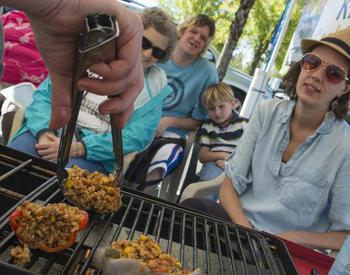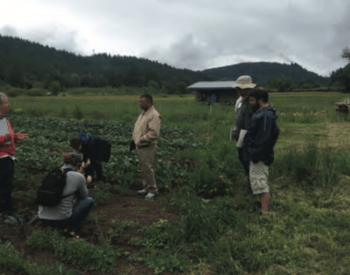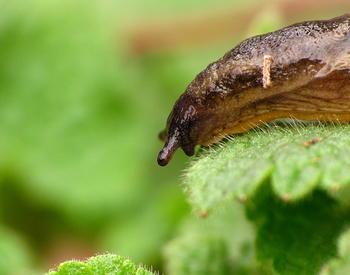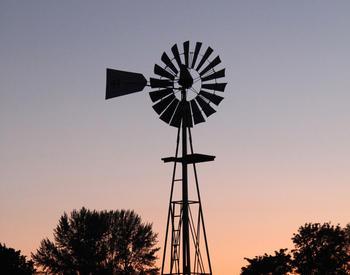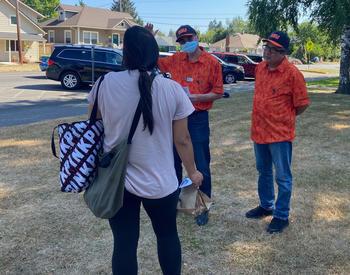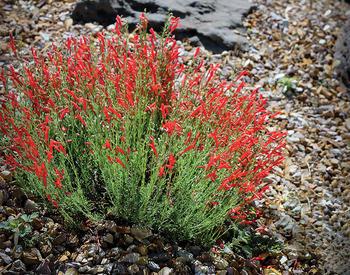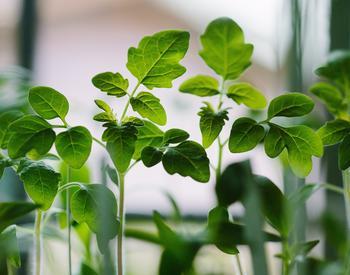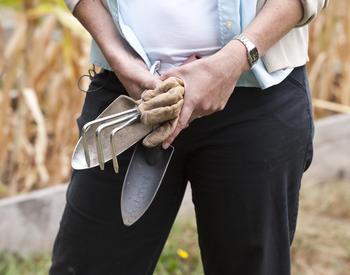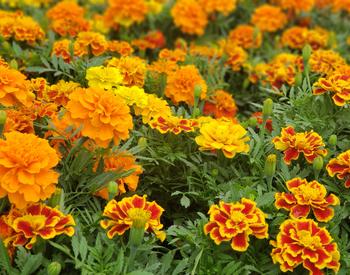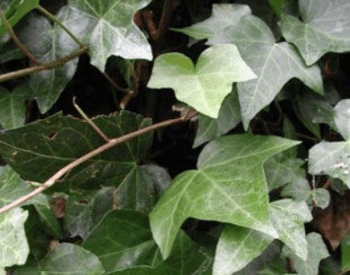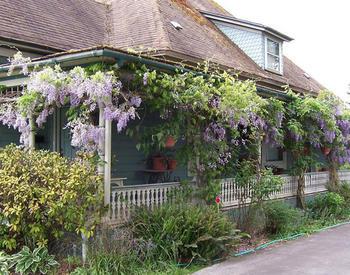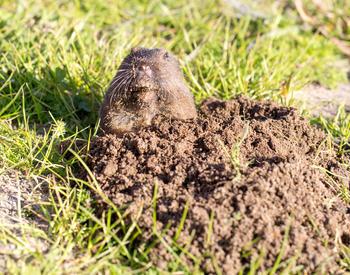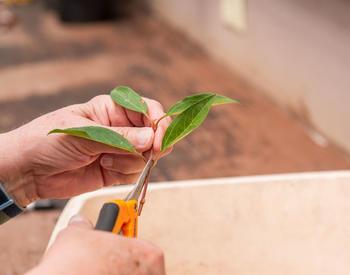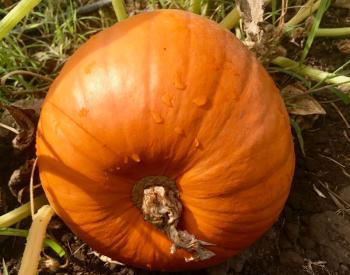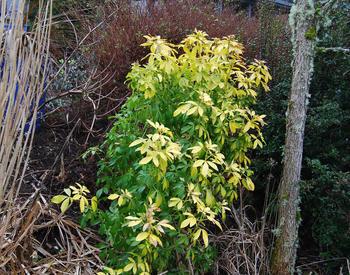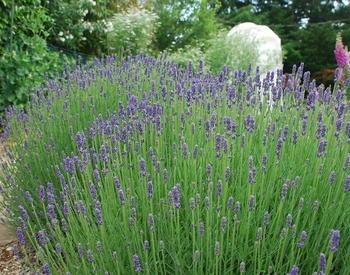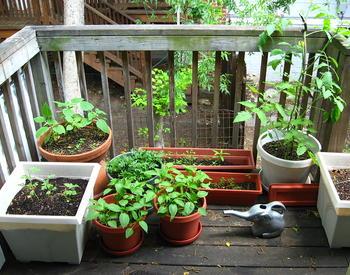CORVALLIS, Ore. – Carol Ruggeri finds the community gardens at Calvin Presbyterian Church in northwest Corvallis calm and serene.
Hundreds of birds lend their song and tall, spreading trees cast shade over a picnic table where gardeners can take a break. The sunny beds in the large garden look ready for the season, neat and tidy before the swelling of summer.
In her section, Ruggeri’s tomatoes, butternut and zucchini squash, lemon cucumbers and snow peas look healthy and vigorous.
“Just to be able to plant a plot and water it and watch it grow is so peaceful,” Ruggeri said. “There’s no one here in the morning so I can wander around and look at the other gardens and get ideas and inspiration. It’s my moment of Zen when I get to be all by myself with the birds singing.
“I lived in Newport for 29 years,” she continued. “All you can grow are raspberries and artichokes. Between the slugs and the weather, you couldn’t grow anything. That’s why I’m so excited.”
Ruggeri is excited not only about gardening. She’s a four-year survivor of pancreatic cancer who participates in Hope Grows Here, a mentorship study with Oregon State University Extension Service Master Gardeners. The study gives her the opportunity to learn and to make friends. In spring, just in time for planting, cancer survivors like Ruggeri are matched with Extension Master Gardeners who work with them from seed to harvest.
Laurie Labbitt, a Master Gardener since 2008 and Ruggeri’s mentor, became part of Hope Grows Here in its first year in 2021. The experience was so rewarding, she decided to volunteer again this year.
“I like to garden and have lots of experience,” said Labbitt, who has been putting a trowel in the ground for most of her life. “I thought this is a program I can be part of. I enjoy working one on one with people, so it fits me better than teaching or other Master Gardener volunteer options.”
So far, it fits Ruggeri, too.
Ruggeri’s response to the study is heartening to both Candance Russo, project coordinator and program manager for OSU’s Moore Family Center for Whole Grain Foods, Nutrition and Preventative Health and Emily Ho, director of OSU’s Linus Pauling Institute and principal investigator on the $50,000 grant from Oregon Health and Science University that propelled Hope Grows Here into reality. An additional grant from the Allen Foundation for $100,000 allowed the study to continue this year and through 2024.
Results show promise
Ho and Russo were researching programs that use gardening as a therapeutic way of helping cancer survivors when they came across a study that measured whether cancer survivors had adopted healthy behaviors after going through a garden mentoring program. Hope Grows Here is based on the Alabama Harvest for Health, which used a randomized study of 46 participants to determine success. Vegetable and fruit consumption increased by approximately one serving a day.
More than 90% stayed in the study and 85% said they would do it again. Though Hope Grows Here is only in its second year, a survey of participants showed improvement in mental health, physical activity and increased fruit and vegetable consumption.
“Research shows the power of vegetables in preventing or slowing down cancer,” Ho said. “We know vegetables like broccoli is great for that, but it’s a struggle to get people to eat it. We want to know how we can get the science full circle and help high-risk people like cancer survivors have an easier way to adopt these behaviors and stay healthy.”
One way to close the circle is through gardening, which research shows has a positive effect on physical and mental health. Matching Master Gardener mentors with cancer survivors helps them develop a positive attitude about nutrition.
“Post-treatment is a critical time for cancer survivors to work toward healthy lifestyle goals, especially incorporating more physical activity and good nutrition,” Russo said. “Learning and practicing the art of vegetable gardening through participation in Hope Grows Here provides a structure to try to reach those goals with regular support from Master Gardener mentors.”
The study is an effort to connect science with community, Ho said. After cancer treatment there is a gap in support. Survivors, who get so much support during treatment, are often left on their own, she said.
“We’re looking at nutrition, physical activity, mental health and sense of community,” Ho said. “This is an opportunity to create peer support and one-to-one support. Gardening hits lots of buckets in terms of health.”
Participants don’t need to be beginner gardeners to be part of the study, said Janet Throop, a second-year mentor who has been a and Master Gardener for more than 40 years. She’s happy to see the study continue for its second year after having to work with her mentee over the phone in 2021 due to the COVID-19 pandemic. Her mentee already knew a lot about gardening but really blossomed under Throop’s guidance, gratifying to Throop who saw her pain and wanted to help.
“My first-year mentee was going through a lot of personal challenges and was under a lot of stress,” Throop said. “She gained a lot of relaxation and benefits being out here and having the garden to escape from thinking about illness.”
Throop knows a bit about cancer. Her sister-in-law, who is a breast cancer survivor, moved her to join Hope Grows Here.
“My sister-in-law was very enthusiastic about a similar program using art,” Throop said. “It was a very good experience for her, and she’s continued on for four years now. She absolutely inspired me. I feel comfortable gardening and I wanted to help so here I am.”
‘She just goes for it’
Ruggeri used the picnic table under the trees on a mild spring morning to chat with Labbitt about the new-this-year get-togethers organized by Russo, who is happy to see the program expand. The gatherings represent what was intended in the first place: mentors and participants meeting in person to share their experiences and create community.”
“It’s nice because you get to meet other people and tour gardens,” Ruggeri said. “I’m such a novice that it’s wonderful. I get so many suggestions.”
The time seemed right for Ruggeri to get involved. She’d just finished treatment when she saw a flyer on a hospital bulletin board. After moving to Corvallis during the pandemic, Ruggeri was anxious to make friends and thought the study would be a good way to connect with people. With her newfound relationship with Labbitt and the bi-monthly get-togethers, she’s on her way.
This year, 13 participants and 12 mentors joined Hope Grows Here, which encompasses Linn and Benton counties. The mentees start the year with a beginning gardening course that comprises four sessions. Some, like Throop’s first mentee, get so much out of the class that they stay with the study.
Through her tutelage, Throop sees her second mentee blossoming. Already a gardener, the participant just needed a nudge – and some support. Support from the church and the bucketful of tools, tomato cages, beginner gardening book, fact sheets and topsoil from the program help, too.
“I think she has good ideas and I’m giving her reassurance,” Throop said of her mentee. “We talk over her ideas, and I tell her, “Yes, that will work,’ and she just goes for it. I think being in the study has encouraged her to do it and follow through and do more than she would have done on her own.”
Additional collaborators on Hope Grows Here are Samaritan Health Services and Pastega Regional Cancer Center, which help with recruitment.
